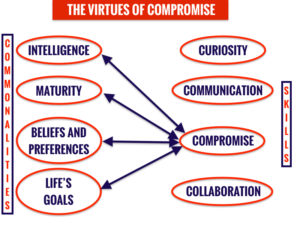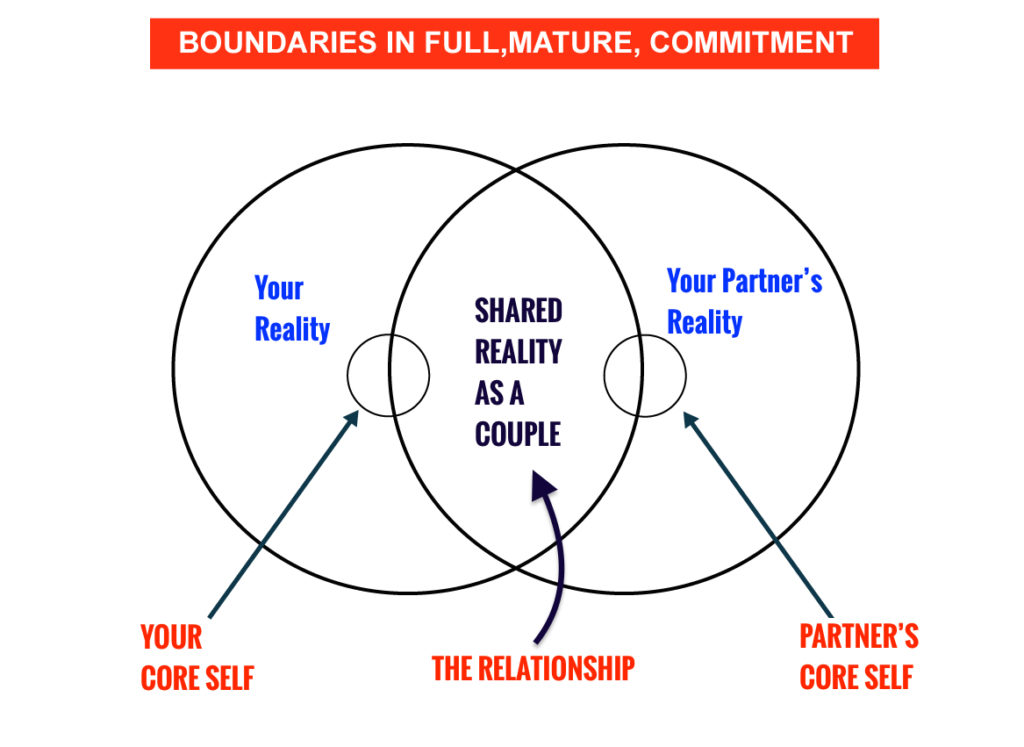To reach Compromise as a Skill of Commitment, we have to have first had mutual Curiosity to even care to learn and integrate goals with another person. And after that, we have to have some reasonable Communication Skills to be able to get across our goals, take in the goals of the partner, and reach some joint goals between us. Then we can move on to Compromise, a kind of synthesis of goals to whatever degree we can do. After Compromise, only then are we ready to truly Collaborate.
When we look to discover what it is we can live without so that there may be harmony and teamwork in our relationship, we have to pay attention enough to valuate what our proposition is for moving toward the joint goals of true teamwork and partnership of intellectual attraction. Without Observing Ego, we may be giving up some part of ourselves in service of the team, which we really couldn’t afford to give up, causing team failure. We might also be demanding of our partner of what they cannot give, and what we shouldn’t even bother to ask.
Think of these four skills, in order, as going from "interest" in one's partner (and self), to "connection" with them, to "synthesis" of identity and goals, then finally, "unity" with each other in a new, action-oriented form.
Likewise, the four "commonalities" or traits that we may have in common, think of as, "how-to" (for intelligence), which comes before "balance of interests and resources" or "pooling of resources" (which comes with maturity), followed by "why do this thing" (that comes from an examination of one's personal and shared beliefs, otherwise, why do the thing?), and then "execution" (which is the nuts and bolts of going for the specific goal, in how we perform.)

The virtue of x is intelligence + compromise. The virtue of Justice is Maturity + Compromise. The virtue of Heroism is Beliefs + Compromise And the virtue of Service is shared Life’s Goals + Comprimise.
Because of what we learn about intellectual attraction, in that it demands that we be fit partners to strive for joint goals as a couple, we must also not forget that the two individuals need to achieve their personal goals too, the "life's mission" or "life's purpose" that they individually seek. Because we aren't identical twins in beliefs, values or goals, we probably will have to strike some compromises on our personal goals for the sake of the joint goals of the couple, but this does not mean that we abandon or must sacrifice entirely and in total, ALL OF OUR DREAMS. This is foolish, and contrary to why people might even want to enter a relationship in the first place.
Compromise might be deferring or delaying part, but not all of one's personal ambitions, dreams or goals, or it might be striving for a more moderate level at them, channeling resources more to the joint goals or the children, than to one's personal needs, or working on them slower in tandem, or taking turns at various points of life. This is another one of those, "you're not with the program" conversations, possibly. Or it gives rise to the saying, "I put my dreams on hold for you" statements.
The truth is that nobody's dreams should ever be permanently put on hold, but compromised on and deferred in parts, or ideally, synthesized in a new collaboration and strategy, where everything gets done in concert.
The less developed you are at compromise skills, the harder the relationship will be, and the more you will be sacrificing, or causing sacrifice in the other partner. Meanwhile, if you had a majority of the commonalities of commitment in place - the beliefs and values, goals, maturity and intelligence in similarity between you, the easier it is to compromise instead of sacrifice.
BACK TO SKILLS OF COMMITMENT


